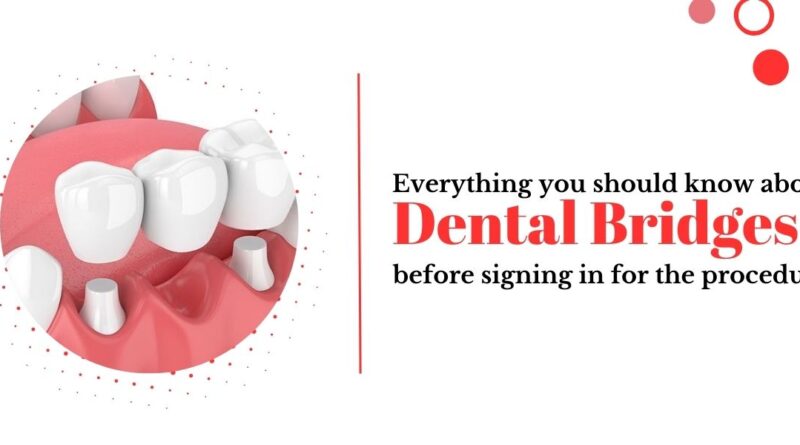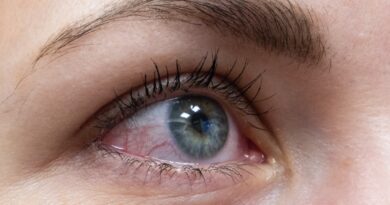Everything you should know about dental bridges before signing in for the procedure
In the world of dentistry, a dental bridge is a widely used appliance and as its name suggests, the appliance bridges a gap in the mouth caused by a missing or lost tooth. a dental bridge involves a false tooth that is bonded to the natural teeth on both sides of a gap. Dental bridges can be broadly divided into two categories – the most common variety consists of two crowns that are permanently bonded to the natural teeth on both sides of a gap with a false tooth (or teeth as well depending on circumstances) placed in the middle. It is important to note that these broken tooth crowns are mostly made of porcelain or metal.
There is also an adhesive bridge which dentists rely upon if the teeth on both sides of an existing gap are sufficiently strong and healthy. An adhesive bridge is actually a false tooth that has “wings” on both sides and these wings are there for a reason. These wings are actually bonded to the rear surfaces of the two supporting teeth on the two sides of a gap in your jaw line. This approach omits the need of preparing the neighbouring teeth on the two sides of a gap for full coverage emergency dental crowns.
Contents
Dental bridges – the benefits
There are lots of benefits that dental bridges offer; most importantly it brings a permanent solution to the issue of lost or missing teeth. Dental bridges offer a significant advantage compared to dental implants. With dental implants invasive surgery is just unavoidable whereas these bridges solve the problem of your missing teeth without surgery. Moreover, thanks to porcelain finishes that are available nowadays, your new bridged tooth looks the same as the other natural teeth in your mouth and remains practically undistinguishable assures a dentist based in London with years of experience in repairing loose dental bridges.
A dental bridge obviously boosts up one’s confidence to a great extent who suffers from a lost tooth or teeth. This particular solution to lost tooth also makes your normal daily activities like eating and talking much easier. When you replace a missing tooth it also helps the other natural teeth in the mouth stay healthier and stronger in their respective positions. When there is a gap in the jaw line the remaining teeth have the tendency to lean over and move into the empty space to fill it up. This in the long run may affect your bite and may also make you more vulnerable to tooth decay.
To cut a long story short dental bridges are no less a smart investment to boost your level of self reliance, quality of life as well as overall oral health.
Alternatives to a dental bridge
There are several options to fill up a gap resulted from a missing tooth or teeth. If you are looking for a reliable option to solve the problem of missing tooth or teeth you must first explore all your options carefully and then zero in on the solution that suits you the best. Your dentist is your best bet to discuss the matter in details. Standard alternatives that modern dentistry offers resolve the issue of missing tooth or teeth are the following –
- Full or partial dentures (in layman’s words, false teeth) and
- Dental implants
Dentures include removable frameworks that are either made of plastic or metal with false teeth attached. On the other hand, a dental implant involves an imitation tooth crown repair made of porcelain fixed atop a metal implant which is directly drilled into the jawbone. The metal that is used in cases of implants is biocompatible in nature and thus the implant post gradually gets fused with eh surrounding bones and the tissues in course of time. It is relevant mentioning that titanium dental implants are significantly popular all over the world these days and the UK is no exception!
Your dentist is your most reliable source to help you choose the best option to fill up the gap of your missing tooth or teeth. it is important to note that the NHS offers both dentures and bridges provided you have a clinical necessity to replace a tooth or teeth. However dental implants are not provided on the NHS and you have to access that only from a private dentist says an expert with years of experience in fixing crowns in London.
Typical cost of a dental bridge
Dental bridges are little costlier than dentures but definitely offer a greater level of comfort tp justify the money you pay. Dental bridges are also an excellent investment in your oral health and dental wellbeing in the long. Abridge helps preserving the remaining teeth in the mouth longer. Dental bridges that are available on the NHS are obviously more reasonably dental crown London price compared to the ones you get from your private dentists. The cost of dental bridges from a private dentist varies distinctly based on the location in your mouth although it typically costs around £100. A dentist will first diagnose your mouth and then give you the exact figures of the cost before going ahead with the treatment.
Fitting dental bridges
In the first step to fit a dental bridge your dentist takes an impression of your mouth. This helps custom designing the appliance so that it fits in your mouth as closely as it is possible. The right shade of your bridge is also matched at this stage to ensure it matches the natural teeth in your mouth.
Based on all these specifications a lab technician custom designs your dental bridge in a dental lab under the instructions of your dentist. Meanwhile dentist may decide to give you a temporary solution like a plastic bridge or dental crown repair. Fitting in a new dental bridge is done under the effect of local anaesthesia on patients. So you do not feel any pain or inconvenience while the procedure is going on.
Once the appliance is fitted the dentist checks that you can bite correctly with the bridge in place and this ensures the procedure is correctly done point out oral health practitioners working in the renowned Emergency Dentists London Pro in London. Initially after a bridge placement you may feel little soreness and discomfort in the gum. There can also be little sensitivity to hot and cold foods as well as drinks. But all these side effects are temporary and they vanish away as you get used to it in a few days.





Pingback: 8 tips to make the best out of your Invisalign treatment